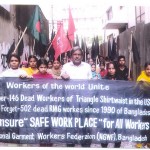Labour stories from around the world.
Survey shows European outlook for growth in 2013 remains bleak
Europe faces rising unemployment for at least another year, amid the most painful convulsions to hit the Continent since it first set out on a path of economic and political integration more than half a century ago, the European Commission reported December 4.
Europe's job crisis, which has left more than 25 million people without work, has stirred rising public hostility and has severely strained the social fabric of several European countries,
including Greece, Spain, and Portugal, where unemployment has soared to over 25 percent.
The economic outlook is bleak and has worsened in recent months and is not expected to improve in 2013. The EU is currently the only region in the world where unemployment is still rising, the report said.
First rally for workers' rights in Qatar
With a construction boom expected in the next ten years in Qatar to prepare for its role as host to the 2022 World Cup, and with billions of dollars of infrastructure projects already
underway, a major problem must be solved: what will be the status of the 1.1 million migrant workers, who will be part of the workforce? Will they be guaranteed the right to form or join unions?
Sharon Burrow, General Secretary of the International Trade Union Confederation (ITUC), said that workers live in squalid labour camps, don't receive their wages on time, and have no independent arbitrator to handle workplace complaints.
A rally on December 1 was the culmination of three days of action in Doba to press the Qatari authorities to ratify and implement ILO standards. The first union "picnic" was held in a local park under the shadow of Doba's towering financial district.
Volkswagen limits precarious work globally
The Volkswagen Group Board of Management and the European Group Works Council signed an agreement to limit temporary work globally at the Group's plants. The ground breaking agreement, signed on November 30, sets principles for use of temporary work in the entire Volkswagen company.
Employers and employees have agreed that there should be moderate use of temporary work at Volkswagen as a "necessary tool of flexibility and it should not exceed 5 percent."
Equal pay — equal treatment is to be put in place, and the wages of temporary workers should evolve, based on gained experience and qualifications similar to the regular workforce.
Workers will receive vocational training that will enable them to follow a third route to become permanent staff at Volkswagen. It is not clear whether other carmakers will offer their temporary workers similar upgrading advantages.
Singapore to deport 29 mainland Chinese bus drivers
For taking part in the city-state's first strike since the 1980s, the government is deporting 29 mainland Chinese drivers and will prosecute five others, according to news reports. The work permits of the drivers had been revoked, and immigration officials "will be repatriating them" for involvement in a two day stoppage to demand better pay and working conditions.
If found guilty of involvement in an illegal strike, they could be jailed fora year or fined a maximum of $1, 640, the equivalent of two months pay for a driver.
A total of 171 drivers launched the strike by refusing to leave their dormitories for work, with the number falling to 88 on the second day. They issued no strike declaration or public statement.
Tunisian unions calls of strike in Silllena
A regional Tunisian labour union has suspended a nearly week long strike in a central impoverished town, after hundreds were injured during clashes with the police. The regional
workers' union in Sillena announced a provisional halt to the strike, hours after agreeing to a deal with the central government in Tuniisia, the capital of this North African nation.
In the deal, the regional governor Ahmad Mahjoubi, of the moderate Islamist Party, Ennabida, was pulled from his post amid accusations that he had neglected public concerns and refused dialogue. A union leader said the strike would resume if he returned.
The economically downtrodden Tunisian town has faced days of protests and violent battles with the police that were reminiscent of the popular uprising two years agao that grew into Tunisia's revolution.
Unions accuse French President of betrayal
French trade unions accused President Francois Hollande of betrayal on December 8, after his government backed from a threat to nationalize ArcelorMittals's Florange steelworks.The Socialist government had said on Friday that it had won promises from ArcelorMittal to avoid forced redundancies and it would inject 180 million euros to develop the Florange plant, meaning it would no longer have to take over the site.
Hollande came to office, promising to create jobs and keep open the two furnaces at the site in northern France, which the company says are not viable in a European steel sector suffering overcapacity. ArcelorMittal confirmed the details of the deal, saying it would negotiate a voluntary redundancy contract with unions.
Workers are angry that the furnaces will remain idle rather than re-opened. They expressed doubt over ArcelorMittal's promise to offer them alternative posts or early retirement packages for the 630 workers affected. "We're on a war footing," say Edouard Martin, head of the CFDT's Florange chapter.



